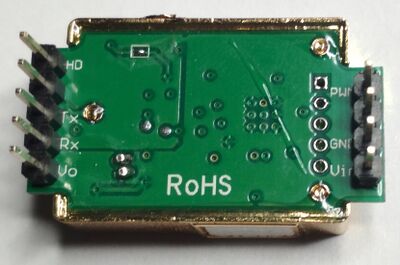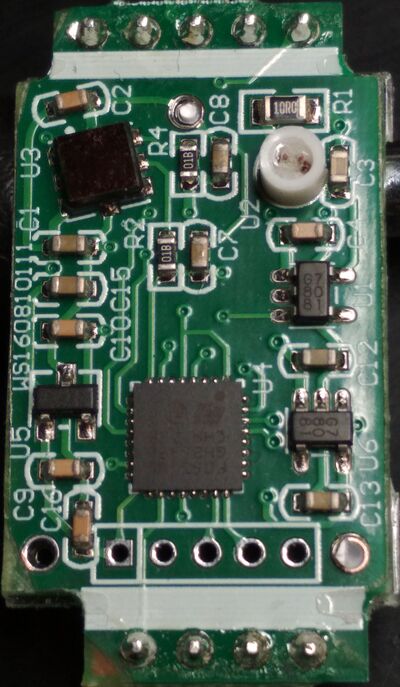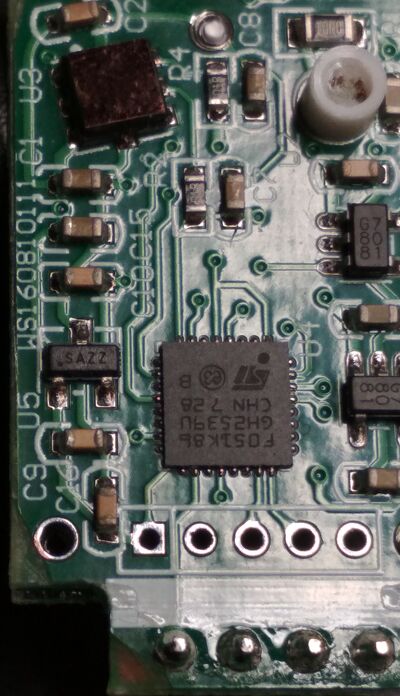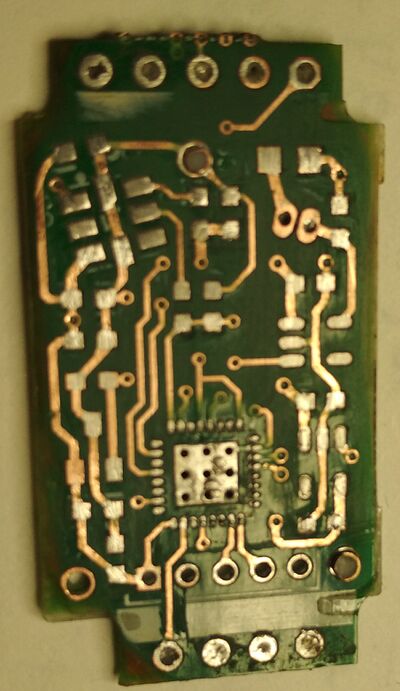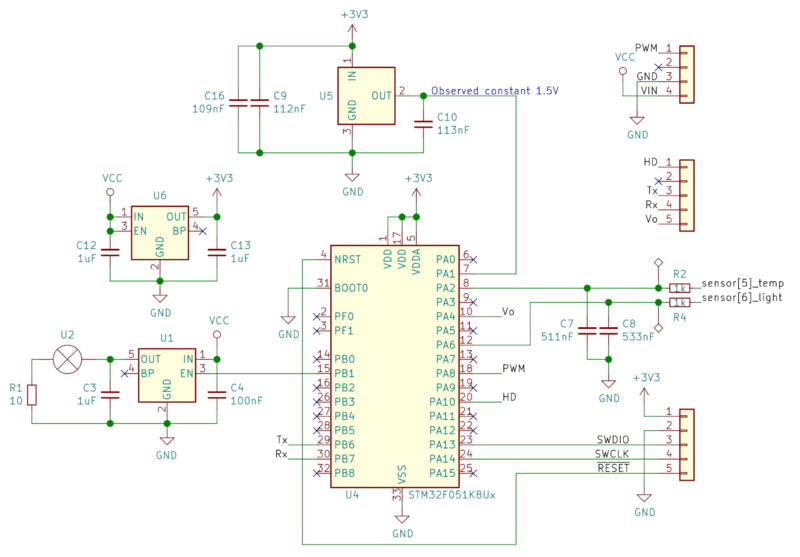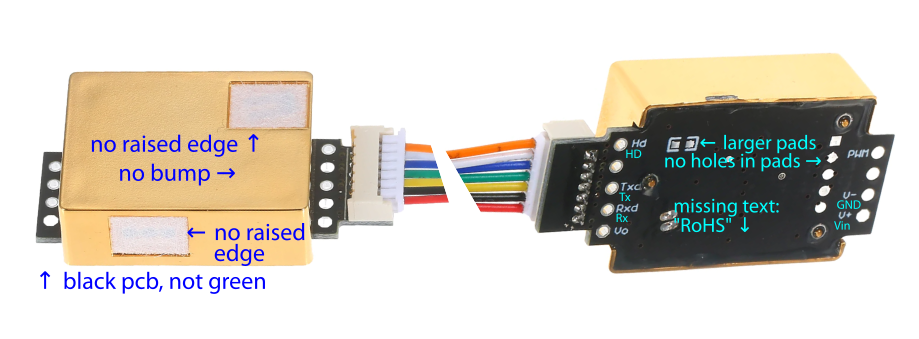MH-Z19B: Difference between revisions
No edit summary |
No edit summary |
||
| (3 intermediate revisions by the same user not shown) | |||
| Line 11: | Line 11: | ||
MH-Z19B is an updated version of the [[MHZ19|MH-Z19]] sensor. | MH-Z19B is an updated version of the [[MHZ19|MH-Z19]] sensor. | ||
Datasheet: https://www.winsen-sensor.com/d/files/ | Datasheet: https://www.winsen-sensor.com/d/files/MH-Z19B.pdf | ||
== Hardware == | == Hardware == | ||
| Line 180: | Line 180: | ||
* Black sealant between case and pcb, instead of clear. | * Black sealant between case and pcb, instead of clear. | ||
They report a sensing capacity of 10000 PPM (as the PPM output at the very first stage of starting up). According to the Winsen MH-Z19B datasheet, only 2000 and 5000 PPM models exist. | They report a sensing capacity of 10000 PPM (as the PPM output at the very first stage of starting up). <del>According to the Winsen MH-Z19B datasheet, only 2000 and 5000 PPM models exist.</del> ''(This was based on version 1.0 of the datasheet. Version 1.5 does list a 10000 PPM model.)'' | ||
The sensors may be suitable depending on what you use them for, but they show severe jitter of up to 50 PPM (peak to peak) and they often don't properly do the ABC. My theory is that they don't ABC correctly because it won't find a suitable baseline with all big deviations going on all the time. Not even smoothing with a 10 minute moving average gets you close to the much more steady results of the original MH-Z19B. | The fake sensors may be suitable depending on what you use them for, but they show severe jitter of up to 50 PPM (peak to peak) and they often don't properly do the ABC. My theory is that they don't ABC correctly because it won't find a suitable baseline with all those big deviations going on all the time. Not even smoothing with a 10 minute moving average gets you close to the much more steady results of the original MH-Z19B. | ||
The firmware reports version 0436 in response to the 0xA0 command. During initialization, the magic value that is 410 PPM (at least in two green pcb MH-Z19B's that look very much like the real thing, with firmware versions 0430 and 0443) and is used for filtering in [https://github.com/WifWaf/MH-Z19 this library], is not 410, but 436. Apart from that, all communication looks normal. | The firmware reports version 0436 in response to the 0xA0 command. During initialization, the magic value that is 410 PPM (at least in two green pcb MH-Z19B's that look very much like the real thing, with firmware versions 0430 and 0443) and is used for filtering in [https://github.com/WifWaf/MH-Z19 this library], is not 410, but 436. Apart from that, all communication looks normal. | ||
Addendum 2020-12-29: received a message from someone who has had the same experience with the black pcb fake MH-Z19B, and they made a video with some measurements: https://www.youtube.com/watch?v=5_QQe75-SZI | |||
Latest revision as of 00:05, 20 January 2021
| Project MH-Z19B | |
|---|---|
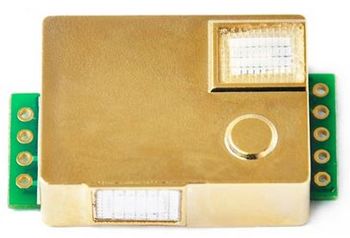
| |
| Some research into the MH-Z19B CO2 sensor | |
| Status | Completed |
| Contact | Disasm |
| Last Update | 2021-01-20 |
Introduction
MH-Z19B is an updated version of the MH-Z19 sensor.
Datasheet: https://www.winsen-sensor.com/d/files/MH-Z19B.pdf
Hardware
- STM32F051K86 MCU
- Unknown analog light+temperature sensor
- Two 3.3V regulators
- 1.5V voltage reference
- Lamp
Teardown
Back side of the MH-Z19B sensor with unlabeled SWD pads on the right:
Front side of the (4-layer) PCB:
Partial schematics:
Firmware
MCU firmware can be easily dumped through SWD pads. Pinout:
| Pin | Signal |
|---|---|
| 1 (square) | 3V3 |
| 2 | GND |
| 3 | SWDIO |
| 4 | SWCLK |
| 5 | RESET (active low) |
Additionally, bootloader asks for a firmware update during the first 20s of startup.
Operation
Firmware turns on lamp for 400 ms and measures sensor response along with the voltage of the voltage reference. This happens again and again in cycle. Default cycle length is 5s.
Firmware measures only a part of the response signal: 180..980 ms interval in 10ms steps. It integrates 180..680 ms interval and removes constant component (1.026V on the image above) based on values from the 930..980 ms interval. Obtained result after some smoothing is available (divided by 2) via command 0x84. This value is used for subsequent computations.
Another firmware turns on lamp for 500 ms and measures 450..500 ms and 1800..1850 ms intervals, then uses the second one to remove constant component from the first one.
As stated in the datasheet, MH-Z19B should be kept away from heat. Experiment showed that the light sensor inside MH-Z19B stops working when MH-Z19B is exposed to an air stream from a heat gun.
Interface
Sensor provides UART, PWM and analog output interfaces. Both PWM and analog output provide CO2 measurement result limited by some bounds. UART interface implements one of several protocols. Default protocol ("operation mode 0") is the richest one.
Protocol (operation mode 0)
All commands and responses are 9 bytes in size. Most of the commands have a response, but some -- don't. Response contains command code, both command and response contain checksum value.
Command format: 0xFF, 0x01, CMD, (5 bytes of parameters), CKSUM
Response format: 0xFF, CMD, (6 bytes of response), CKSUM
For short, hereinafter this response will be called "ACK": 0xFF, CMD, 0x01, 0x00, 0x00, 0x00, 0x00, 0x00, CKSUM
In the following table in Request and Response fields only the meaningful bytes will be shown. For example, b[3] is the first parameter byte and b[3..4] is the first two parameter bytes forming a word. "???" means "isn't investigated yet", an empty field means "no parameters".
| Command | Request | Response | Description |
|---|---|---|---|
| 0x78 | b[3] | no response | Changes operation mode and performs MCU reset |
| 0x79 | b[3] | ACK | Turns ABC logic on or off (b[3] == 0xA0 - on, 0x00 - off) |
| 0x7D | r[7] | Returns ABC logic status (1 - enabled, 0 - disabled) | |
| 0x7E | b[3], b[4..5] | r[2..3] | Sets timer cycle length (b[4..5]) in seconds and returns current value. b[3] should be 2 to update the length |
| 0x80..0x83 | b[3], b[4..7] | no response | Writes one double word to the 1024-byte configuration area (offset = b[3] + (CMD - 0x80) * 256).
Command 0x80 with b[3]==0 clears the whole configuration area. On timeout this configuration area will be written to flash. |
| 0x84 | r[2..3], r[4..5], r[6..7] | Returns "raw" values. r[2..3] is a half of the raw light sensor value. r[4..5] is constant 32000.
r[6..7] is different in different versions of firmware: bit field or maximum light ADC value | |
| 0x85 | r[2..3], r[4..5], r[6..7] | Returns "raw" values. b[2..3] is smoothed temperature ADC value. b[4..5] is CO2 level before clamping.
b[6..7] is minimum light ADC value | |
| 0x86 | r[2..3], r[4], r[5], r[6], r[7] | r[2..3] - "final" CO2 level. r[4] - (temperature in C) + 40
r[6] and r[7] - if ABC turned on - counter in "ticks" within a calibration cycle and the number of performed calibration cycles. | |
| 0x87 | b[5], b[6], b[7] | r[2], r[3..6] | ??? |
| 0x88 | b[3..4] | r[2..3]=b[3..4] | ??? |
| 0x8D | no response | MCU reset | |
| 0x90..0x93 | b[3] | r[2..5] | Reads a double word from configuration area by offset (b[3] + (CMD - 0x90) * 256) |
| 0x94 | b[3], b[4..6] | r[2..6] | Changes 3 bytes (b[4..6]) of "id string" with offset (3*(b[3] - 1)) |
| 0x95 | b[3] | r[2], r[3], r[4..6] | Reads 3 bytes of "id string" (b[4..6]) with offset |
| 0x99 | b[4..7] | ACK | Sets sensor range. Note that parameter bytes differ from those in the datasheet. |
| 0x9A | b[4] | ACK | ??? |
| 0x9B | r[2..5], r[6], r[7] | Returns sensor range (r[2..5]) | |
| 0x9C | r[2..5], r[6]=1 | ??? | |
| 0x9F | b[3] | ACK | ??? |
| 0xA0 | r[2..5] | Firmware version string? "0430" and "0443" observed | |
| 0xA1 | b[3] | ACK | ??? |
| 0xA2 | b[3] | r[2], r[3..6] | ??? |
| 0xA3 | r[2..3] | ??? | |
| 0xA4 | b[3..4], b[5..6] | r[2] | Setting bounds for DAC output, r[2]==1 on success |
| 0xA5 | r[2..3], r[4..5] | Reading bounds for DAC output | |
| 0xAA | b[3], b[4] | r[2], r[3] | ??? |
| 0xAB | b[3], b[4] | r[2], r[3] | ??? |
| 0xAC | b[3] | r[2], r[3..6] | ??? |
Fake MH-Z19B (black PCB)
(Added by Juerd (talk) 04:20, 30 November 2020 (CET))
There are sensors out there, sold as MH-Z19B, that seem to use the original firmware, but with different hardware.
The hardware differs with the original MH-Z19B in the following ways:
- Case:
- No circular bump over the lamp (a faint impression can be seen under an angle)
- No raised edges around the square "windows"
- Slightly more yellowish gold color
- PCB:
- Black instead of green. This is the most recognizable difference.
- Silkscreen differs
- "RoHS" is missing
- Pins are labeled differently: Hd/Txd/Rxd/V-/V+ instead of HD/Tx/Rx/GND/Vin
- SWD pads have no holes
- The pads in the top left corner are much larger
- Vias are in completely different locations
- The 3×3 grid of thermal vias under the MCU is missing
- Wider neck between pin holes and connector tab
- Black sealant between case and pcb, instead of clear.
They report a sensing capacity of 10000 PPM (as the PPM output at the very first stage of starting up). According to the Winsen MH-Z19B datasheet, only 2000 and 5000 PPM models exist. (This was based on version 1.0 of the datasheet. Version 1.5 does list a 10000 PPM model.)
The fake sensors may be suitable depending on what you use them for, but they show severe jitter of up to 50 PPM (peak to peak) and they often don't properly do the ABC. My theory is that they don't ABC correctly because it won't find a suitable baseline with all those big deviations going on all the time. Not even smoothing with a 10 minute moving average gets you close to the much more steady results of the original MH-Z19B.
The firmware reports version 0436 in response to the 0xA0 command. During initialization, the magic value that is 410 PPM (at least in two green pcb MH-Z19B's that look very much like the real thing, with firmware versions 0430 and 0443) and is used for filtering in this library, is not 410, but 436. Apart from that, all communication looks normal.
Addendum 2020-12-29: received a message from someone who has had the same experience with the black pcb fake MH-Z19B, and they made a video with some measurements: https://www.youtube.com/watch?v=5_QQe75-SZI
